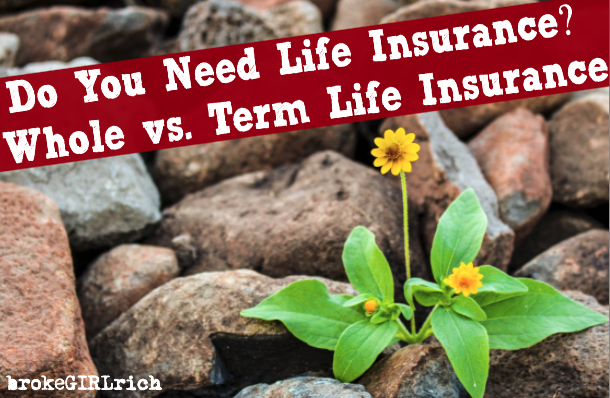
Do You Need Life Insurance? Whole vs. Term Life Insurance | brokeGIRLrich
Let’s talk a little about life insurance.
Life insurance is an insurance you buy that pays out in the event of your death. It’s pretty easy to do some research and find some whole and term life insurance quotes on the internet.
There are two main types: term life insurance and whole life insurance.
Term life insurance lasts for a set term (usually between 1-30 years). The vast majority of term life insurance is called level term, which means it is worth the same amount the entire time. You may also see something called decreasing term, which means the amount of the benefit reduces over time. Decreasing term life insurance is pretty rare.
It can be difficult to get term life insurance once you are older, with many companies denying coverage to anyone whose term would end after they are 80 years old.
Whole life insurance does not have an expiration date and last for your whole life. With whole life insurance usually your premium stays the same over the years and your benefit stays the same. Generally, the younger you are when you sign up, the less you pay each month.
A benefit to whole life insurance is that it comes with an attached savings account, so if you decide to end your benefit, you usually receive a certain cash out amount.
When I was born, my dad took out a very cheap life insurance policy on me. When I was in my twenties, he told me about it and turned it over to me. I cashed that sucker right out and used the money to pay off some debt.
There are two types of whole life insurance: universal and variable.
Universal (sometimes called adjustable) allows you to change your coverage type (f you pass a medical exam) if you want to later one. It also allows you to adjust your payment amount depending on the amount in your cash account (the savings vehicle for this insurance type). This can be handy to weather some of the curveballs life throws at you, but you have to make sure if the cash account gets used up that you are still setup to make the full payments or your insurance could lapse.
Variable life insurance is more tied to the market, so while there is a potential for better returns, you also risk have a lower payout benefit if you die while the market is down.
Well, if anyone relies on your income, probably you – unless you are very wealthy. If the loss of your salary would jeopardize your family, you probably want some life insurance.
If you are the full time caregiver for anyone (children, disabled or elderly), you probably need enough life insurance to pay for a caregiver, so the primary breadwinner in your family can continue to work.
However, if you have enough savings, or no one relies on your income, you may be able to skip life insurance.
I mentioned that I cashed in mine as soon as I knew it existed. I was super thankful my dad paid $10-20 a month for that thing because it had a cash value of about $4,000 by the time he turned it over to me 25 years later. However, assuming he paid $15 a month for 25 years, he paid $4,500 for me to have that money.
If I had died at some point, he and my mom would’ve received $100,000.
Was it worth it? Honestly, probably not, though he may have purchased it when I was little because money was super tight and I was born with some unexpected health things. I guess at the time they would’ve struggled to bury me. And over the years, he just let the $15 roll.
Personally, I don’t have life insurance now because no one relies on me and my savings more than cover a funeral… so what would be the point?
That being said – most people don’t manage to roll through life keeping their responsibilities as minimal as I have, so making sure you have the right insurance amount to keep your loved ones safe is an important task to tackle.



